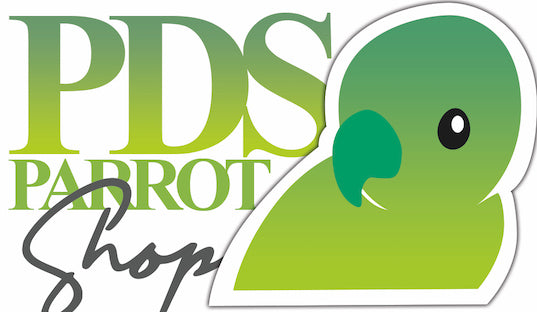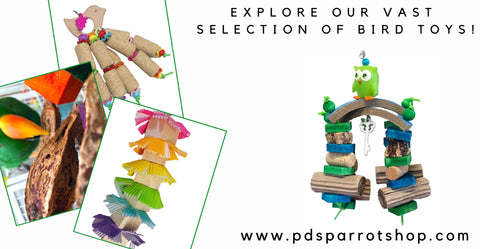
Social Media Misinformation: Separating Fact from Fiction in Pet Bird Care
Share
In today's digital age, social media platforms have become the go-to source for information on virtually any topic, including pet bird care. However, the ease of sharing and accessing content online has also led to the spread of misinformation. False information about pet birds can result in misguided care practices that may harm these delicate creatures. This article aims to separate fact from fiction, providing accurate and reliable information to ensure the well-being of our parrots. By understanding and debunking common myths, pet bird owners can make informed decisions and provide the best care possible for their avian companions.

False: Sunflowers/ Safflowers are harmful and shouldn’t be given to parrots.
Truth: Sunflower and safflower seeds are safe for parrots when offered in moderation as treats. These seeds are high in fat and can be an excellent source of nutrients and energy for parrots. However, they should not be the primary staple of a parrot's diet due to their imbalanced nutritional profile.
Overconsumption of sunflower and safflower seeds can lead to obesity and other health issues in parrots. Therefore, it is important to provide a varied and balanced diet that includes a mix of fresh vegetables, high-quality pellets, fruits, grains, legumes, and occasional treats. For parrots like Amazons, which are prone to fatty liver disease, all fatty foods, including sunflower seeds, should be limited. Sprouting sunflower seeds is a great way to use them.
False: Apple seeds will kill your bird.
Truth: This statement comes from the fear of knowing that apple seeds contain cyanide. However, there is so little cyanide in apple seeds that a parrot would need to eat 100 seeds in one go to cause any effect. It is simply not possible for harm to occur at this rate. Rumor has it that almonds contain more cyanide than apple seeds.
False: Brown Rice is better than White Rice.
Truth: The benefits of brown rice are so small compared to white rice that, on some packages, their nutritional values are the same. White rice has a higher GI value than brown rice. However, brown rice does contain anti-nutrients and arsenic. If you are using white rice with vegetables as part of a complete diet, then white rice will be a healthy grain to use, and its benefits will outweigh those of brown rice. However if your parrot is over weight, substituting to brown rice can help.
False: You should feed your parrot eggs/meat.
Truth: While parrots are primarily frugivores (fruit eaters) and granivores (seed eaters), their diet in the wild is quite varied and sometimes includes insects and worms. In the wild, parrots fly 6 to 12 miles per day. Any animal protein they consume is quickly used up during their daily activities, unlike parrots that perch in a cage all day long.
Consuming meat can lead to health issues such as obesity, liver disease, and heart problems because parrots' digestive systems are not designed to handle large quantities of animal protein. Parrots generally get sufficient protein from other sources like beans, lentils, and specially formulated pellets.
False: Giving your bird cereals or other fortified foods.
Truth: Plain cereal like Cheerios or other fortified foods can cause problems for parrots. These foods are fortified for human consumption, not for pet birds. There are plenty of healthy options available from bird food companies that fortify foods according to the specific needs of pet birds, not humans. I would personal not feed my birds plain cheerios, but recommend puff rice as a substitute.. Label info below.

False: These veggies are toxic to pet birds and should be avoid: mushrooms, garlic, tomatoes, celery, spinach, parsley, dandelion, peanuts
Truth: These are all safe to use. Mushrooms from the grocery store are safe, and garlic/tomatoes can be used sparingly. Spinach and parsley are also safe in moderation. Human-grade, ROASTED peanuts are safe and shouldn't have any issues with fungus. Roasting peanuts reduces the toxic in peanuts. I don't understand why social media has an issue with dandelion greens; I use them for my birds all the time.
False: Use any cooking oil for your birds.
Truth: Not all cooking oils are healthy, as they are pure fat. Cooking oil should be avoided if possible. Instead, use alternatives like bananas, applesauce, or other ingredients. For a detailed discussion on cooking oil, check out this article: Best cooking oils for your pet birds' health.
Navigating the vast sea of information on social media can be challenging, especially when it comes to the care of pet birds. It is crucial to critically evaluate the sources of information and rely on credible, expert-backed advice. By dispelling common myths and highlighting the facts, we can ensure that pet birds receive the care they need to thrive. Remember, the well-being of your parrot depends on accurate knowledge and informed decisions. Let's work together to promote a more informed and responsible pet bird care community online. Whenever in doubt, please contact your vet for information.
Citations:
Das, U. N. (2006). Essential fatty acids: Biochemistry, physiology and pathology. Biotechnology Journal, 1(4), 420-439. https://pubmed.ncbi.nlm.nih.gov/16892270/
Baumgartner, J. (2018). Understanding pet bird nutrition. University of Florida IFAS Extension. Retrieved from https://edis.ifas.ufl.edu/publication/VM067
Zhu, Y., Zhang, Z., Cao, Y., Chen, X., & Ren, H. (2021). SARS-CoV-2 evolution and immune escape. Frontiers in Immunology, 12, 771376. https://www.ncbi.nlm.nih.gov/pmc/articles/PMC8164413/
Sipos, P., Peles, F., Brassó, D. L., Béri, B., Pusztahelyi, T., Pócsi, I., & Győri, Z. (2021). Physical and chemical methods for reduction in aflatoxin content of feed and food. Toxins, 13(3), 204. https://www.ncbi.nlm.nih.gov/pmc/articles/PMC7999035/
LaFeber, B. (2022, July 19). Feeding eggs to parrots. LaFeber Pet Birds. Retrieved from https://lafeber.com/pet-birds/questions/feeding-eggs-to-parrots/
Echols, S. (n.d.). Healthy avian diets. Harmony Animal Behavior. Retrieved June 24, 2024, from https://www.harmonyanimalbehavior.com/healthy-avian-diets-by-dr-scott-echols
More Articles on Bird Health
Organic vs Traditional Foods for Your Pet Bird: An Expensive Trend?
Herbal Tea for Birds | A flavorful and health promoting addition
Vitamin D Deficiency In Our Pet Bird
Birdie Bread: A Healthier Alternative to Bread [Birdie Bread Recipe]
Author: Monika Sangar
Molecular Biologist, worked with avians for 15 years
Co-founder of Prego Dalliance Sanctuary, Artisan of PDS Parrot Shop
Monika Sangar, the co-founder of Prego Dalliance Sanctuary, a 501c3 non-profit organization, uses these blogs to share her hands-on experience with parrots.
She is a designer and artisan at PDS Parrot Shop, and her craft can be viewed below. (click on icon)


2 comments
Thanks for helping to separate fact from fiction and for providing accurate, reliable information on pet bird care. It’s so important to have trustworthy resources to ensure the well-being of our feathered friends.
Great info! My African grey absolutely loses it when he hears the crinkle of garlic. He gets a small clove to unpeel and eat a couple nibbles. I quit telling anyone because of judgment. He’s 28, I’ve had him since he was a baby and I cook with a lot of garlic! lol.